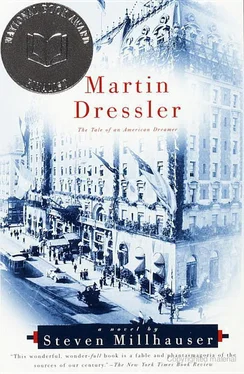He laid out his plan carefully before the chief engineer, whose good will he had felt from the beginning and whose clear hard sense of how things worked was never dry or dreary. Martin described his interview with the banker and presented the plan in its entirety: a lunchroom on the first floor and a billiard parlor on the second and third floors. Dundee listened thoughtfully, then put down his fork and asked detailed questions that soon revealed flaws in Martin’s thinking. It would take much more money than he had imagined to build the ground-floor lunchroom, which couldn’t simply be inserted into the existing structure but would require the knocking down of interior walls. And the building was an old one, fitted for gas. It would have to be wired for electricity — had he thought of that? Martin, who had wanted advice about securing a loan and had secretly hoped that Dundee himself, after hearing the scheme, might be willing to serve as guarantor, now felt irritable and idiotic. He scraped back his chair and was about to rise when Dundee began scribbling figures on a piece of paper, tapping the pencil eraser against his upper lip, and scribbling again. He slid the paper across to Martin. “This is a rough estimate — very rough, since I haven’t been inside the place in ten years. You never know about those old buildings. What I propose is this. I’ll put up the money myself in return for a partnership: fifty-fifty. Even Steven. Goes without saying I’ll have to check the place first.”
Martin, who was still irritable and whose first impulse was to refuse the offer, accepted in confusion, and that night in bed he tried to understand his odd impulse of refusal and the slight disappointment he continued to feel in the center of his exhilaration. What irked him was the idea of the partnership itself, for he had wanted to do something on his own steam. He felt a kind of inner straining at the leash, an almost physical desire to pour out his energy without constraint. This secret ingratitude, which in one sense disturbed him, in another pleased him immensely, for wasn’t it the sign of his high desire? And from somewhere in the region of his stomach came a burst of gratitude to Walter Dundee, for permitting him to know his desire.
Martin now flung himself with full energy into his new scheme, eating quick dinners at the hotel dining room and hurrying over to the Paradise Musée with Walter Dundee. Within a week he confessed to himself that his partner was invaluable. Martin had known exactly what was necessary in a well-run cigar stand, but his sense of a desirable lunchroom, though clear and precise in certain respects, was weakened by small failures of imagination. Dundee, striding up and down the ground floor of the Paradise Musée, pausing to take measurements and make sketches, tackled one technical matter after another: the gas fixtures needed to be replaced by modern incandescent lighting, the walls needed to be knocked down, the window openings enlarged and fitted with sheets of plate glass. One of the marble fireplaces might be retained as a decorative touch, but steam radiators fed by a boiler would provide the heat. Dundee examined the floors and walls, which were solid, prowled in the cellar, noted a loose baluster on the stairway leading to the third floor. The yellowing cold-water washstand in its dank closet was thirty years out of date. Dundee proposed brand-new plumbing, a big new lavatory with marble washstands having two ivory-handled faucets and hot-and-cold running water, and private pull-chain toilets for the use of customers. Martin followed each idea closely, placed it in the general plan, evaluated it in relation to the larger scheme; and though he deferred to the older man’s superior knowledge, Dundee in turn listened to Martin’s sharp, vigorous sense of what customers would find attractive in a lunchroom. Dundee, whose impulse was always in the direction of the practical and efficient, wanted to seat as many customers as the available space permitted; Martin persuaded him to sacrifice a number of seats for the sake of an elusive but crucial principle: the slippery element, created from a combination of many small precise decisions, known as atmosphere. A hungry man would stop anywhere for a bite to eat. What Martin wanted was the kind of lunchroom that would attract a man who wasn’t hungry.
“You want to lure ’em in, do you?” Dundee said, looking at Martin with amusement.
“I want more than that,” Martin said. “I want to keep ’em in. I want people to return. I want them to be unhappy when they’re not here.”
“That’s a tall order,” said Dundee.
“It’s a tall city,” Martin said quickly.
One Saturday about a week after workmen began to arrive at the Paradise Musée, Martin took Bill Baer to look at the work. He had spoken to Walter Dundee about his friend, with a view to including him somehow in the project, and as he stepped among workmen’s tools and piles of lumber and old sawhorses he tried to make Baer see the new lunchroom — the gleaming windows, the curve of the polished oak counter, the pedestal tables, the steady glow of electric lights. Later, at dinner, he made his proposal: Bill would give up the cigar stand and come to work on the first of the year for Martin and Dundee. They needed a man to oversee the daily operation of the lunchroom and billiard parlor, to keep close track of expenses and profits, to be on the premises, to settle problems and keep his eyes open — to serve in short as a kind of managing assistant, at a salary nearly double his present one. Martin, who had expected to see a look of bewildered gratitude on Bill Baer’s face, was puzzled to see him stare down at his plate with a small tense frown. He looked up and said, “It’s not for me.”
Martin gave an impatient little lift to his shoulders and turned both hands palm up.
Bill said, “Oh, I could probably learn the ropes well enough, and not shame myself or let anyone down. And God knows I can use the money. But I’d never feel — it would never suit me, Martin. I’d always feel I was in over my head. Cigars are what I know — it’s in my blood. I’m a cigar man, every inch of the way.”
“You’re any kind of man you damn well want to make yourself,” Martin said, surprised by the sharpness in his voice.
“Then I damn well want to be a cigar man.”
“Then what you damn well want—,” Martin began, but gave it up. Bill was explaining how he wanted to have a cigar store of his own one day, maybe down in the old neighborhood; he was saving like crazy. He too broke off and looked sharply at Martin.
“Look here, Martin. Say someone offered to let you run a carriage factory, or a big city bank. The whole shebang. Would you do it?”
“Like that,” Martin said, snapping his fingers.
Bill burst out laughing. “I think you really would.” He shook his head. Martin expected him to say something more but Bill took a long drink of beer, and the next day, as Martin reported the conversation to Walter Dundee, he didn’t know what irked him more: the sharp tone he had taken with his friend, or Bill’s bewildered, slightly sorrowful shake of the head. Dundee, who had had misgivings about hiring an amateur, was visibly relieved, and Martin turned his attention to a part of the business that Dundee had failed to consider at all.
Martin had been studying the rows of advertising cards that adorned the inside of every car on the horse railway lines, for he had immediately sensed their tremendous power: people trapped in the slow-moving cars, with nothing to look at except the face of some stranger across the way, let their gaze drift to the advertisements, which attempted to seize their attention with bold lettering and clever pictures calculated to make a sharp, decisive impression. The Jap-a-lac lady in her white apron, painting a window frame and smiling at the viewer over her shoulder, or the man in the ad for Sapolio soap, staring at his face reflected in the shiny back of a pan, were the daily companions of thousands of horsecar riders, who saw the same ads in daily papers and weekly magazines, on cards in shop windows, on posters stuck on hoardings and the walls of El stations, until they were as familiar as the nose on George Washington’s face. One afternoon Martin paid a visit to one of the new downtown ad agencies, which placed ads in newspapers and did business with a dozen different streetcar lines, including the new Broadway cable cars. The art director agreed to prepare some sketches for him.
Читать дальше












